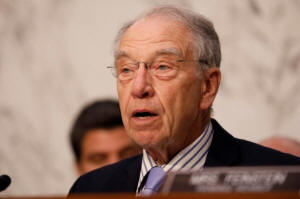|
U.S. congressional panels spar over
'Trump dossier' on Russia contacts
 Send a link to a friend
Send a link to a friend
 [October 11, 2017]
By Mark Hosenball and Jonathan Landay [October 11, 2017]
By Mark Hosenball and Jonathan Landay
WASHINGTON (Reuters) - Three congressional
committees are scuffling over a former British spy's reports that are
central to investigations into U.S. allegations that Russia tried to
help Donald Trump's 2016 presidential campaign, people involved in the
inquiries said.
The dossier assembled by former MI6 officer Christopher Steele outlined
Russian financial and personal links to Trump's campaign and associates.
The Senate Intelligence Committee and special counsel Robert Mueller are
looking into possible collusion between Russia and Trump's campaign and
Mueller's investigators have met with Steele.
However, the Republican chairmen of the House Intelligence and Senate
Judiciary committees are challenging the dossier's credibility and one
has implied that Russians may have played a role in its preparation,
sources familiar with the inquiries said.
The duel is not purely partisan. Senator Richard Burr, the Republican
chairman of the Senate Intelligence Committee, and Mark Warner, the
committee's ranking Democrat, are leading what other committee members
from both parties called a serious effort to pursue the allegations dug
up by Steele.

"As I understand it, a good deal of his information remains unproven,
but none of it has been disproven, and considerable amounts of it have
been proven," Democrat Sheldon Whitehouse, a member of the Senate
Judiciary Committee, said in an interview with Reuters. He did not
elaborate.
Russia has repeatedly denied any interference in last November's
election won by businessman Trump, a Republican, against Democrat and
former secretary of state Hillary Clinton. Trump has denied any
collusion by his campaign or associates.
In a report published in January four U.S. intelligence agencies said
they took the dossier's allegations seriously.
Senate Judiciary Committee Chairman Chuck Grassley has been the harshest
public critic of Steele, suggesting that Russia might have somehow had
influence with Fusion GPS, the U.S. opposition research firm that hired
Steele, and that they may have broken U.S. law.
The dossier was first commissioned on behalf of Trump opponents in the
Republican primary and then Democrats took it up when Trump became the
presidential nominee. Steele met with FBI representatives before the
election to discuss his findings.
In a March 6 letter to then-FBI Director James Comey, Grassley wrote:
"The idea that the FBI and associates of the Clinton campaign would pay
Mr. Steele to investigate the Republican nominee for president in the
run-up to the election raises further questions about the FBI's
independence from politics, as well as the Obama administration's use of
law enforcement and intelligence agencies for political ends."

Whitehouse, however, said that a July 27 Judiciary Committee hearing
called by Grassley was part of a Republican effort to discredit Steele
by creating "confusion" and the false impression that Russia paid Steele
for the dossier.
[to top of second column] |

Senator Chuck Grassley (R-IA) asks a question during a Judiciary
Committee hearing into alleged Russian meddling in the 2016 election
on Capitol Hill in Washington, U.S., July 26, 2017. REUTERS/Aaron P.
Bernstein

"It could not have been clearer that there is no evidence of any
Russian role behind the Steele dossier," Whitehouse said.
A Judiciary Committee aide, speaking on the condition of anonymity,
said: "The American people need to be able to trust that the FBI and
Justice Department are operating free from political influence.
That's what this investigation is about, and we will follow the
facts wherever they lead."
Despite recusing himself in April from the House Intelligence
Committee investigation, the Republican chairman, Devin Nunes, is
also trying to discredit Steele's work, sources familiar with the
probe said.
On Tuesday, Nunes subpoenaed the partners who run Fusion GPS, the
U.S. opposition research firm that hired Steele, a source familiar
with the matter said.
"This is a blatant attempt to undermine the reporting of the
so-called 'dossier,' even as its core conclusion of a broad campaign
by the Russian government to influence the outcome of the 2016
presidential election has been confirmed by the U.S. intelligence
community and is now widely accepted as fact," Joshua Levy, counsel
to Fusion GPS, said in a statement.
Committee Democrat Eric Swalwell also fired back, saying Nunes told
Congress he had recused himself and that issuing the subpoenas would
violate that recusal.
"It is also a way to go it alone, not work with Democrats, and it
looks like he is trying to again undermine the investigation,"
Swalwell said.

Nunes also used his power last month to issue subpoenas to the FBI
and Justice Department, FBI Director Christopher Wray and Deputy
Attorney General Rod Rosenstein, demanding that they surrender their
files on Steele, his dossier, and their investigations into his
work.
So far, the Justice Department and FBI have not turned over the
information Nunes requested because of the FBI investigation, which
is supervised by special counsel Mueller.
Mueller's office declined to comment on the request or the
investigation.
(Reporting by Mark Hosenball and Jonathan Landay; Editing by John
Walcott and Grant McCool)
[© 2017 Thomson Reuters. All rights
reserved.]
Copyright 2017 Reuters. All rights reserved. This material may not be published,
broadcast, rewritten or redistributed. |